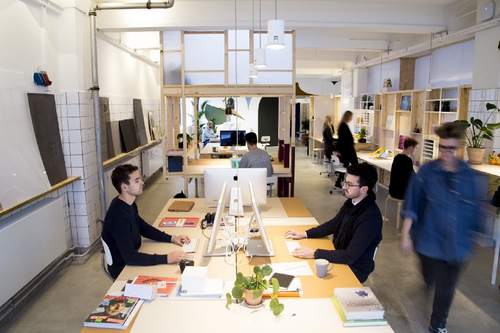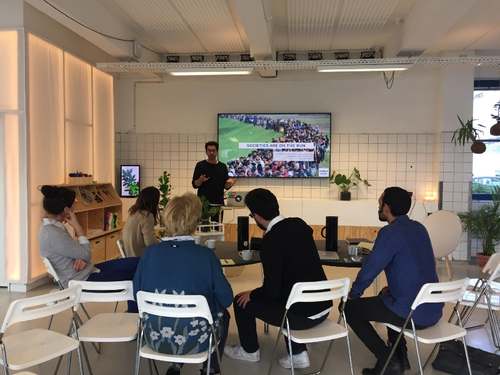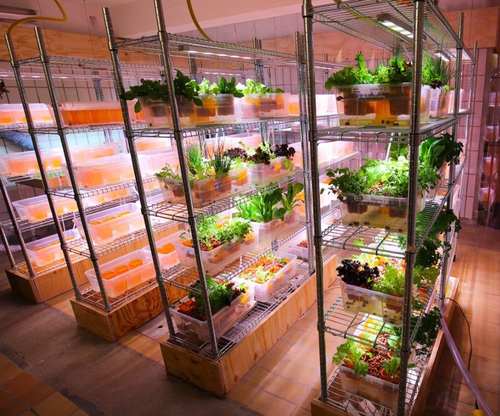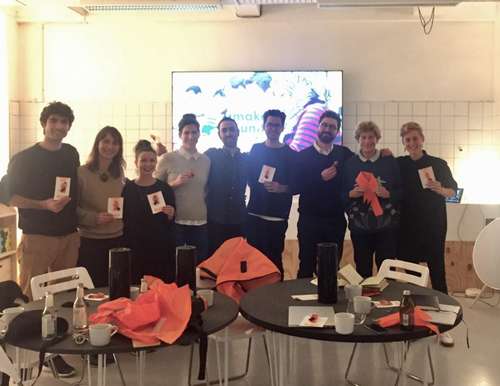From September to November, we have been very busy with developing and testing an effective social inclusion programme based on collaboratively creating sustainable products. While getting to know each other, participants discover their talents, ambitions and how to connect to local networks. Talents discovered in our programme are matched to a expanded network of companies, educational institutions and organisations enabling participants to take further steps in their lives and careers.
The future of meatballs, conversational interfaces and virtual reality
On the 29th of November, we were invited to Copenhagen to visit Space10, a future living-lab founded 2 years ago by IKEA. Being a future think-tank, they relate to their mother company’s main mission: Creating a better everyday life for the many people - setting out to explore possible future scenarios, detect potential disruptions, understand global challenges and, most importantly, design for people’s dreams and aspirations. This is done through experimental projects, workshops, talks and residencies within various areas, ranging from Virtual Reality to future food production.

An example of the latter is Tomorrow’s Meatball, a visual exploration of how we could be eating in the not too-near future — read here more about how Space10 celebrated their nomination for an Innovation by Design award, by opening a pop-up restaurant in Brooklyn, New York.
So why exactly were we meeting up with them?
Although food production, AI and VR are things that at first sight might not relate directly to the core-activities of Makers Unite, we found out we have a very important and basic thing in common: empowering people through the power of making.
Creating a global community: Precious Plastic Machines
After a quick presentation of what Makers Unite does, two residents of Space10 explained us their projects. Mattiá Bernini took us to his “plastic library”, where he recycles plastic with his Precious Plastic Machines. The main objective, however, lies not in recycling plastic, but in providing people all over the world knowledge on how to make machines that can recycle plastic. All his machines are open-source, using simple technology and resources, so that people can easily make their own machines locally. By this, he envisions to empower a community of makers and recyclers, for whom plastic waste serves as a starting point.
Producing food without soil or sunlight: The Farm
In the basement of the old fishery building Space10 is located in, Stefannia Russo introduced us to The Farm, an exploration on how to grow food in a controlled environment. The Farm does this by using techniques such as hydroponics, a process where natural soil is replaced with alternative components that provide the exact right conditions for the plants to grow. There is almost 100 percent water use reduction, less waste production and no need for sunlight. Plants do not only grow 4 to 5 times faster than in a field, but also need much less space than with traditional farming. This all leads to a smaller carbon footprint.
Our discussion evolved with the input of a special guest to the meeting who has been working with refugees in Denmark for about 30 years. She revealed a similar issue to what we have experienced in The Netherlands: most refugees in Denmark don’t have time for volunteering. They have to learn the language, many have a family to take care of, they move to a new house — and all of them want to start working as soon as possible.
How can we apply this to the growth of our programme?
Makers Unite as a makerspace?
So how exactly does all this relate to our work with Makers Unite and how can we use all this input to develop Makers Unite into a next stage? Although the aforementioned projects focus on plastic recycling and food production, respectively, there is still a basic mission that unites all three:
empowering people and creating a community through the act of making.
Think of the structure of a Fablab or Makerspace: a platform that enables newcomers to make most use of their ideas + skills + resources while generating viable future-proof solutions.
Makers Unite could become a place where people come together, share knowledge, build their own projects — using new technologies, new machines, open to use for everyone. All these activities serve as a base to stimulate engagement and connection within a community.
Sounds nice, but what exactly would this look like?
Makers Unite X The Farm - a pilot for a ‘Social Living Lab’
In questioning how we might create a makerspace for newcomers we started brainstorming on a variety of topics. Do our products have to be physical, for example? Or if we are all about telling a story and creating awareness, could Makers Unite then also create and sell experiences?
Considering future scenarios and the possibility of scaling what we do locally, into a global context, we looked into how our way of working could be adapted to different local contexts. What would be a Danish version of Makers Unite? How would our process and outcome change, due to different laws and regulations or cultural circumstances? And what would happen if we use other resources and material than textile?
The discussion helped us understand that a single underlying vision can inform multiple — seemingly unrelated — contexts. Inspired by a project as The Farm, Makers Unite could for example experiment with the area of food production. This would still be developed according to our specific programme of social inclusion, however, the result being food instead of a textile product.
To put words directly into action, we agreed with Space10 to start a research on how our programme can be applied to The Farm. The purpose of this exploration is to bring in newcomers to work with future food production while creating connections with the local community. At the same time newcomers can bring in their own expertise on how to cultivate and cook with their local seeds and species.
The combination of the narrative from Makers Unite and the social purpose of producing food by growing local & ‘newcomer’ seeds is a perfect match. This would enable the development of what we call ‘Social Living Labs’: spaces for the exploration and empowerment of people’s talents in order to foster social inclusion.
In the coming period, Space10 and Makers Unite will start exploring the development of this research which will be of great added value for scaling our programme, as well as broadening impact of our shared values on the future of sustainable living.
We thank the organisation of the Refugee Challenge and Ikea Foundation for the opportunity and great time spent with the creative minds behind Space10. Looking forward to the next steps!
For more information please check our website www.makersunite.eu and drop us a line at share@makersunite.eu


